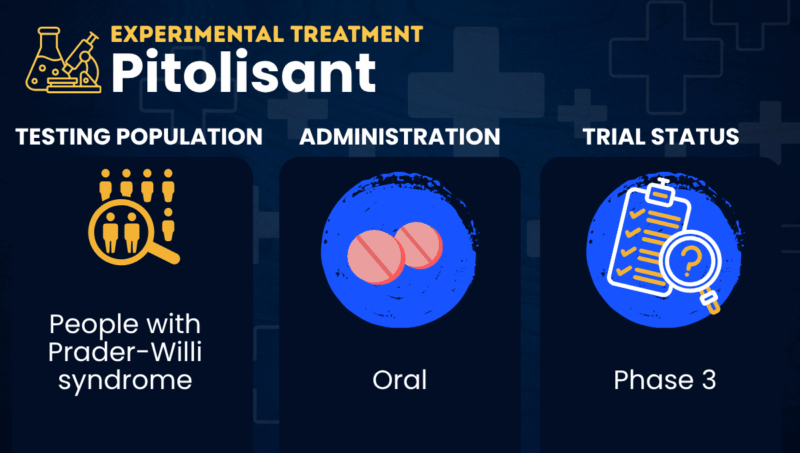Pitolisant for Prader-Willi syndrome
Last updated Oct. 22, 2025, by Marisa Wexler, MS

What is pitolisant for Prader-Willi syndrome?
Pitolisant is an oral therapy that Harmony Biosciences is developing to reduce excessive daytime sleepiness, or EDS, in people with Prader-Willi syndrome (PWS).
A rare genetic disorder, PWS can result in a wide range of symptoms, including excessive hunger, behavioral problems, and EDS, the latter of which is reported in between 52% and 100% of patients. These symptoms are thought to be a result of PWS-associated changes in the hypothalamus, a brain region that controls several essential functions, including hunger, mood, and the sleep-wake cycle.
Originally developed by France’s Bioprojet, pitolisant works by promoting the release of histamine in the brain. Although this signaling molecule is mostly known for its role in allergic reactions, in the brain it promotes wakefulness, which is why certain allergy medications such as antihistamines can cause drowsiness as a side effect.
The oral therapy is approved in the U.S. for reducing EDS or sudden loss of muscle tone in adults with narcolepsy, a sleep disorder. It is sold in the country by Harmony under the brand name Wakix.
Harmony is investigating whether pitolisant could also help combat EDS in people with PWS, for which the therapy has received orphan drug designation in the U.S. This status is meant to accelerate pitolisant’s clinical development and regulatory review in the country.
The therapy is also being tested in people with a neuromuscular disease called myotonic dystrophy type 1.
Therapy snapshot
| Treatment name: | Pitolisant |
| Administration: | Being tested as oral tablets |
| Clinical testing: | Currently in a Phase 3 clinical trial |
How will pitolisant be administered in Prader-Willi syndrome?
Pitolisant is available as oral tablets. In PWS clinical trials to date, it has been given once daily upon waking at a dosage based on each individual’s age, ranging from 8.9 mg to 35.6 mg.

Pitolisant in Prader-Willi syndrome clinical trials
A U.S.-based, proof-of-concept Phase 2 clinical trial (NCT04257929) enrolled 65 people, ages 6 to 65, with PWS and EDS. Participants were randomly assigned to take either a low pitolisant dose, a high pitolisant dose, or a placebo once daily for 11 weeks, or nearly three months. The low and high doses of pitolisant were each based on age and distinct between children, adolescents, and adults.
While the trial was not set up to detect statistically significant changes in outcomes between pitolisant and placebo groups, results showed that the high pitolisant dose was generally linked to greater, clinically significant reductions in:
- EDS
- behavioral problems
- excessive hunger
Benefits were generally greater among children.
The global Phase 3 TEMPO trial (NCT06366464), designed to test pitolisant against a placebo in up to 134 PWS patients ages 6 and older with EDS, was started in early 2024. Participants will take pitolisant or a placebo for 77 days, or about 2.5 months.
The main goal is to assess the effect of treatment on a self-reported measure of EDS severity called the Patient-Reported Outcomes Measurement Information System Bank v1.0 – Sleep-Related Impairment. Secondary measures include changes in clinical scores of hyperphagia, irritability, and other behavioral problems.
Common side effects of pitolisant
In the Phase 2 trial of pitolisant in people with PWS, the therapy appeared to be generally safe and well tolerated, without reports of serious adverse events. The most commonly reported adverse events, found at higher rates than in the placebo group, were:
- anxiety
- irritability
- headache
Prader-Willi Syndrome News is strictly a news and information website about the disease. It does not provide medical advice, diagnosis, or treatment. This content is not intended to be a substitute for professional medical advice, diagnosis, or treatment. Always seek the advice of your physician or other qualified health provider with any questions you may have regarding a medical condition. Never disregard professional medical advice or delay in seeking it because of something you have read on this website.
Recent Posts
- Palatin to test 2 obesity-targeting drugs for PWS in clinical trials this year
- Still-recruiting ARD-101 trial for PWS lowers US enrollment age to 7
- For rare disease families, February is a month of both love and awareness
- Muscle, bone signaling imbalances found in non-obese PWS children
- Most PWS patients meet nutrient targets but struggle with calorie control
- Adults with PWS need lifelong support in daily activities, study finds
- Celebrating a milestone in life with Prader-Willi syndrome
- New technique ‘wakes up’ silent genes in Prader-Willi in lab testing
- Probiotics may boost beneficial gut bacteria in Prader-Willi syndrome
- Avoiding meltdowns during the holidays with Prader-Willi syndrome